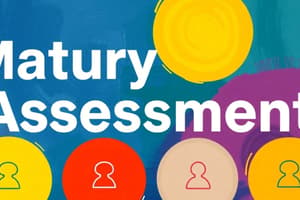Podcast
Questions and Answers
What characterizes a novice company's performance?
What characterizes a novice company's performance?
- Implementation of continuous improvement strategies
- Regular communication of new processes
- Cluttered and outdated workspaces (correct)
- Efficient time management practices
During which maturity level do teams start to organize items and dispose of unneeded ones?
During which maturity level do teams start to organize items and dispose of unneeded ones?
- Novice
- World-Class
- Learning (correct)
- Competent
Which phrase is commonly associated with the novice level?
Which phrase is commonly associated with the novice level?
- 'We're continuously evolving'
- 'We have no time for this' (correct)
- 'This is a new approach for us'
- 'We have time to improve'
What is a key characteristic of the learning phase in maturity assessment?
What is a key characteristic of the learning phase in maturity assessment?
What might be found in a learning phase workplace despite initial cleanliness?
What might be found in a learning phase workplace despite initial cleanliness?
What does the term 'maturity level' refer to?
What does the term 'maturity level' refer to?
Which of the following is NOT typical of a novice company?
Which of the following is NOT typical of a novice company?
What signifies the overall performance of a world-class company?
What signifies the overall performance of a world-class company?
What is a key characteristic of a world-class company?
What is a key characteristic of a world-class company?
What regular practice is essential for maintaining workplace organization in a world-class company?
What regular practice is essential for maintaining workplace organization in a world-class company?
How does a world-class company manage work-in-process effectively?
How does a world-class company manage work-in-process effectively?
What outcome is expected from a perfect score on the maturity assessment?
What outcome is expected from a perfect score on the maturity assessment?
What should be done with unneeded items in a world-class company?
What should be done with unneeded items in a world-class company?
What signifies the competence level in workplace improvement?
What signifies the competence level in workplace improvement?
Which of the following is NOT a characteristic of a sophisticated work environment?
Which of the following is NOT a characteristic of a sophisticated work environment?
What best describes the changes in habits associated with the competence level?
What best describes the changes in habits associated with the competence level?
Which behavior indicates the most advanced stage of workplace organization?
Which behavior indicates the most advanced stage of workplace organization?
How are frequently used items managed in a sophisticated workplace?
How are frequently used items managed in a sophisticated workplace?
Which area would typically be found organized at the competence level?
Which area would typically be found organized at the competence level?
What is a key feature of visual management in a sophisticated workplace?
What is a key feature of visual management in a sophisticated workplace?
In which environment can files be quickly retrieved within ten seconds?
In which environment can files be quickly retrieved within ten seconds?
Flashcards
Maturity Assessment
Maturity Assessment
A tool for evaluating how well a company has implemented improvement initiatives, specifically in terms of the five levels of workplace organization.
Purpose of Maturity Assessment
Purpose of Maturity Assessment
The goal is to identify areas for improvement and track progress over time. It helps in achieving a clean and organized work environment.
Frequency of Maturity Assessment
Frequency of Maturity Assessment
The frequency should be regular and consistent to ensure ongoing progress and identify issues proactively. It can depend on the company goals and size.
Using Internal Maturity Assessment Results
Using Internal Maturity Assessment Results
Signup and view all the flashcards
Using External Maturity Assessment Results
Using External Maturity Assessment Results
Signup and view all the flashcards
Novice Company
Novice Company
Signup and view all the flashcards
Learning Company
Learning Company
Signup and view all the flashcards
Competent Company
Competent Company
Signup and view all the flashcards
Sophisticated Company
Sophisticated Company
Signup and view all the flashcards
World-Class Company
World-Class Company
Signup and view all the flashcards
Competent (Level 3)
Competent (Level 3)
Signup and view all the flashcards
Sophisticated (Level 4)
Sophisticated (Level 4)
Signup and view all the flashcards
Model Workplace
Model Workplace
Signup and view all the flashcards
Single Minute Retrieval
Single Minute Retrieval
Signup and view all the flashcards
Surprise Inspections
Surprise Inspections
Signup and view all the flashcards
Standardized Folders
Standardized Folders
Signup and view all the flashcards
Competition between teams
Competition between teams
Signup and view all the flashcards
Areas of Responsibility
Areas of Responsibility
Signup and view all the flashcards
Study Notes
Maturity Assessment for Organising for Efficiency
- This chapter details the assessment for Organising for Efficiency, illustrating the journey to continuous improvement.
- 'Maturity level' describes a company's performance relative to best practice.
- There are five levels of company maturity.
Level 1: Novice
- A novice company is just starting out, with the lowest performance.
- Characterized by a traditional, disorganized approach.
- Unnecessary items (files, documents, equipment) are prominent.
- Notice boards contain outdated information.
- Wastebins aren't emptied, and waiting times for help are significant.
- Cables are not organized, posing safety hazards.
- Employees use phrases like "we have no time for this" or "that's how it's always been."
Level 2: Learning
- Improvement efforts start with a single focus.
- Teams begin disposing of unwanted items and organizing needed items.
- The workplace appears partially organized at first glance but may still contain unneeded items (boxes, files, books) piled against walls or under desks.
- Unneeded items may also be stored in computer folders or shared network drives.
- Items are not spotless but might have numerous stickers or sticky notes.
- Walls might be dirty or in need of paint.
- Unnecessary items on horizontal surfaces should be stored, and items not used regularly should be removed.
- Time spent searching for items is reduced; one model workplace per department is the goal.
Level 3: Competent
- Employees adopt world-class continuous improvement principles.
- The principles are broadly applied across the company, leading to improved productivity, quality, and delivery.
- The workplace becomes organized; habits change.
- All items are cleared from beneath desks, horizontal surfaces, and vertical surfaces (no leaning); items aren't stacked against walls or pillars.
- Outdated notices on display boards are removed.
- Responsibilities are clearly allocated across teams and competition between teams promoted.
- Hidden areas (archives and storage) are organized.
Level 4: Sophisticated
- Work reflects classical performance-driven teams.
- Visual management is complete, and all work areas are model workplaces.
- Proper filing and efficient work management are used on computers.
- Storage areas are clearly marked and labeled based on usage.
- Color coding facilitates easy identification of frequently used files or manuals.
- Files, books, and equipment are easily located.
- Checklists exist to evaluate workplaces and recognize extra effort.
- Items are organized and stored based on frequency of use (frequently used items are within reach).
- Teams can access information within one minute in paper format or within ten seconds in computer format.
- Items are returned to designated locations.
Level 5: World-Class
- The company embraces change readily.
- Prepared to adapt to external conditions.
- Highly flexible, reliable, innovative, and productive.
- Able to meet ever-changing client requirements.
- Routine inspections, the effort to eliminate excess paper or unnecessary filing, and visual management of work-in-progress characterize this level.
- Maintaining minimum and maximum stock levels, a perfect score on maturity assessments.
- Identifies the causes of workplace disorder, and eliminates them.
- Employees clear out unneeded items and keep the workspace neat via routine clearing operations.
- Other modules of continuous improvement are significantly improved (e.g., increased productivity, reduced mistakes, decreased customer complaints, shorter delivery times).
Studying That Suits You
Use AI to generate personalized quizzes and flashcards to suit your learning preferences.




